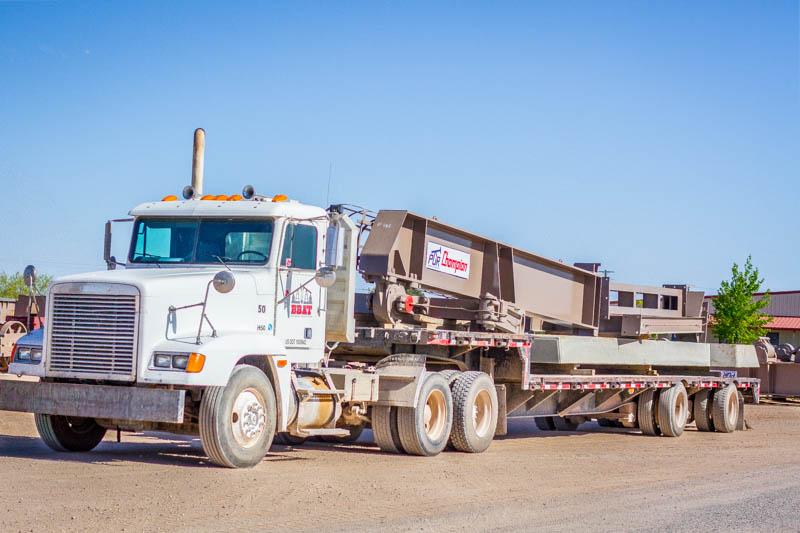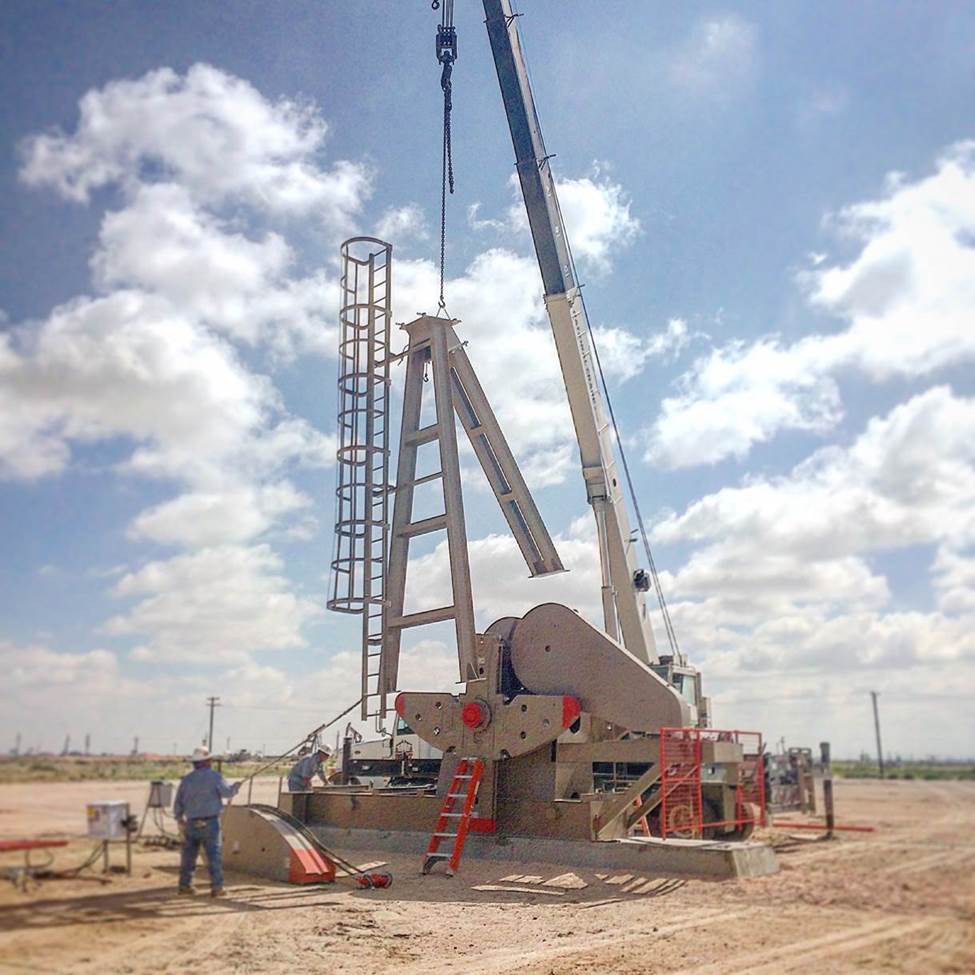Stayin’ Alive in the service sector; Startups, innovation, and Ramen noodle budgets keep the doors open.
by Paul Wiseman
At his previous employer’s office (a multinational oilfield service behemoth) Randy Guice’s desk was near the elevator. From that vantage point he could observe newly laid-off employees being escorted glassy-eyed out the door, clutching their personal belongings in a cardboard box.
But when one particularly respected veteran stopped at Guice’s desk on his way to the unemployment line, pointed a finger at him and said, “Look deeply into my face, Randy. This is YOU in 30 years,” it chilled him to the bone. It was as if the Ghost of Christmas Future had showed him Tiny Tim’s grave. At that point Guice knew he had to take control of his destiny.
So he decided to say goodbye to his steady job and to start his own service company. He thought, “I’m not going to be here [at his old job] in this position next time. I don’t want to be the last one to turn the lights out.”
But there was bit of serendipity on the way to starting his own drilling tool company. While assembling business plans and approaching possible investors, including “a couple of angel investors,” he piqued the interest of three groups. “I was very shocked at the amount of money that’s out there that people want to put to work,” he observed.
Instead of investing in Guice’s startup, one of the prospective angel investors decided to bring Guice on board as a full-salaried executive vice president over business development. The company, Houston-based Genco Energy Services, also gave him an equity share in the new venture, Cobra Drilling Solutions, which they own. Guice works out of the company’s Midland office.
Although this wasn’t what Guice started out to do, he says, “I don’t think I could’ve dreamed up a better scenario” than what actually happened.
The new venture is an outgrowth of Cobra Downhole and Cobra Through Tubing. As for Cobra Drilling Solutions, “We’ll be doing downhole tool rental of stabilizers, reamers, any sort of custom fabrication that any operator may need, non-mag rentals, and also vertical control directional drilling,” along with custom fabrication, Guice said. Drilling optimization is in the future, as are some proprietary tools currently under development. Release date for the new tools is expected to be after the first of 2017. Automation for drilling systems is also in the works.
The reason Guice left his previous job to start new in a downturn was as much about avoiding the downside— as in not turning out the lights—as about the upside. Plus, he loves a challenge.
He said of entrepreneurs like himself, “We can be bullheaded people—and sometimes that’s a good and a bad thing. It’s not the size of the dog in the fight, it’s the size of the fight in the dog.”
The positive side of the downturn is that quality people are available for him to hire. Guice includes himself in that group. Cobra is looking to expand across Texas and into other oil producing regions, he said, having already hired someone for Pennsylvania.
Guice said potential clients—producers of all sizes—have received the new venture well. During the startup phase he and the marketing department are working on what exactly they will offer clients, along with branding and image-building. He sees everything from business cards to mode of dress as essential to creating the brand he wants to present to clients.
Big Bear Aggie Tech cuts prices, waves goodbye to truck salesmen
For an established company like Big Bear Aggie Tech, surviving means better prices. But exactly what a “better price” means depends on which side of the bargaining table you’re on, according to Mark Bales, the company’s owner and CEO.
The price squeeze presents challenges to BBAT, said Bales, because, “We’re a very relational, service-driven company and that’s where our strength is. So how do you maintain that with zero-to-very-little profits?” The goal becomes staying in the market and even growing market share.
“Obviously right now, if you’re not going to make any profits, if you can grow market share and stay positioned during this time, you probably are doing well,” he continued.
BBAT has cut its workforce by a relatively small 15 percent—to 112 people—and has not cut salaries for the remaining employees. Bales noted that many competitors have cut staff by more than half or have gone out of business altogether. The company has gained some market share, both from those who have closed their doors and those who have had larger layoffs.
Staffing cuts do not reflect a slowdown in business, Bales noted, only a reduction in profits. “I think our work has stayed pretty steady, other than [reductions in] the pricing standpoint. We’re probably doing just as many jobs as we’ve always been doing.” Having to bid down each of those jobs caused BBAT to focus more closely on internal procedures and efficiencies in order to survive.
“Doing more with less” is how HR Manager Mike Williams describes their efficiencies. When pressed for details, Bales noted that they eliminated some duplication of personnel. The current company came into existence in December of 2012 with the merger of Snyder-based Big Bear Oilfield Services with Midland’s Aggie Tech Energy Services. As that merger occurred during boom times, they could afford to retain some duplication of effort.
Not any more.
Double machine shops? Gone. Duplicate prep areas? Toast.
They centralized everything to the Midland office, with only some satellite yards in other locations. Consolidation led not only to greater efficiency but also to improved quality control.
Marshall Bales, Mark’s brother, put it this way: “Strict budgeting—it’s sort of a Ramen noodle budget if you will.
“We haven’t had any new equipment purchases” since the price drop, Marshall continued. “It’s been two years since we bought a pickup truck—just an F-150 for a salesman.” No tandems, no cranes, nor any large equipment has made it to the yard either. It’s reached the point that they will have to replace some equipment soon, no matter the economy. And while they have bought some machinery at auction, from companies that have closed their doors, it’s not what they would like.
Ironically, when prices do start to rise, the initial phase will bring even more pain for a service company like theirs, said Mark Bales. “A downturn is hard, but coming out of a downturn is more challenging. So now, the challenge for service companies really is, how do you respond to an uptick?”
In that scenario it takes a while for the bigger money to trickle down to service companies—meanwhile, the cost of labor rises in the form of overtime and higher starting salaries, greater fuel costs, and the absolute necessity of replacing worn out equipment.
To boost revenue BBAT began to do some wholesale machine shop work for other companies. Said Mark Bales, “Rather than just using our machine shop capabilities to take care of ourselves, that became kind of its own business model too, doing outside machining, outside fabrication, stuff like that.”
Peak Completions, the “Big Chief pad and crayon company,” innovates its way through the valleys.
“Peak is doing fairly well compared to a lot of people that we come across,” said Bryan Fitzhugh, VP of sales for Peak Completion Technologies, Inc. “Break-even is a good number in these times, and we’re doing better than that.”
Keeping the firm at its peak is its strong commitment to developing and adopting new technology, designing and manufacturing their tools in-house. Fitzhugh noted that keeping R&D funded in tight economic times is a challenge, but Peak has found a way to continue innovating.
“If you can’t compete at the bottom, it makes it very difficult to stay in business.” Fitzhugh sees most of the technology in the completion business as commodities.
“We just innovated several new tools. We’ve got some patents coming out on technology called our Set-A-Seat [product] and we’re trying to exploit that technology as much as we can.” The product uses Peak’s dissolvable frac balls, which save money by eliminating the need to mill out after treatment.
Also, “We’re in a partnership with Parker Hannifin group to provide that equipment. That’s an exciting tool for us. We think that’s a game-changing technology, definitely not a commodity,” he said.
Fitzhugh believes Peak is one of the few companies still able to innovate with the level of price pressure being applied today. Occasionally the company has to walk away from work because the income would be too low if there is no possibility of getting additional work from that client later. “A one-off job for a loss is really not something we would consider,” he said.
Like BBAT, Peak has had to lay off only a minimal amount of its workforce, with approximately 165 still drawing a paycheck.
With international offices in Houston and other locations across the United States, the Midland-based company, founded in 2003, is still by far more active in the Permian Basin than anywhere else.
To diversify its revenue base beyond completions, Peak recently added fishing and rental tools to its product line—which is actually a fourth major division for the company.
“Two years ago the company was still pretty focused on open-hole multi-stage systems. We broke the company up into three divisions,” he said. One was for liner hangers, one for service tools, and one for completion tools. Peak Fishing Tools, as the new effort is named, is the fourth division.
Fitzhugh said the diversification into services beyond open hole completions has greatly helped the company combat tough times. Another thing helping them is the fact that they have little debt.
For the next few months, cost control and continued innovation—they have more new products to release before the end of 2016—are the goals.
Noting that all if the company’s new technology is customer driven, he said, “Peak is the Big Chief pad and crayon company.” Rather than asking customers to order from a set catalog, “We would much rather come in with our Big Chief pad and a pack of crayons and see what it is they need. We feel like that’s the best way to get and maintain relationships.”
Beyond the news of massive layoffs and stock price slides are the faces of the people; people who’ve gotten out their Big Chief pads, put on their thinking caps, rolled up their sleeves, and made things work in spite of the markets. Tiny Tim would be pleased to see this group and say, “God bless us, every one.”
Paul Wiseman is a freelance writing based in Midland, and a frequent contributor to PBOG Magazine.












